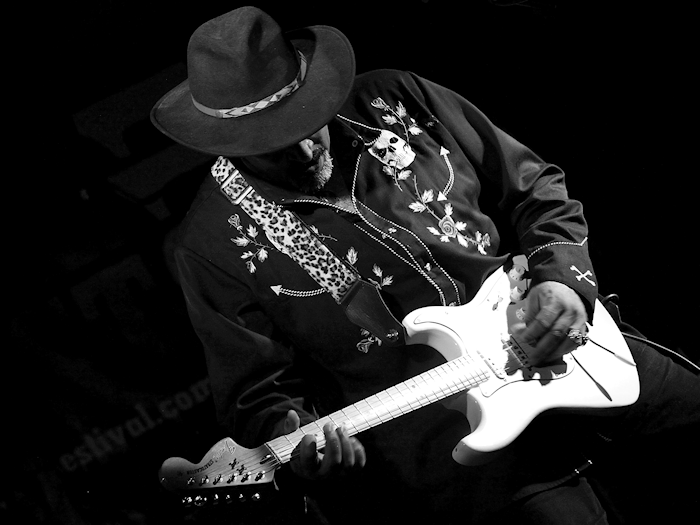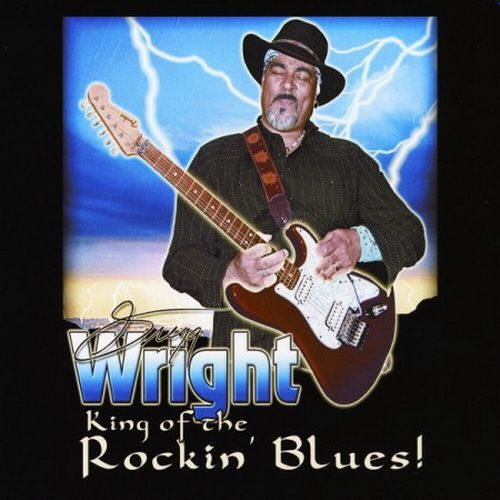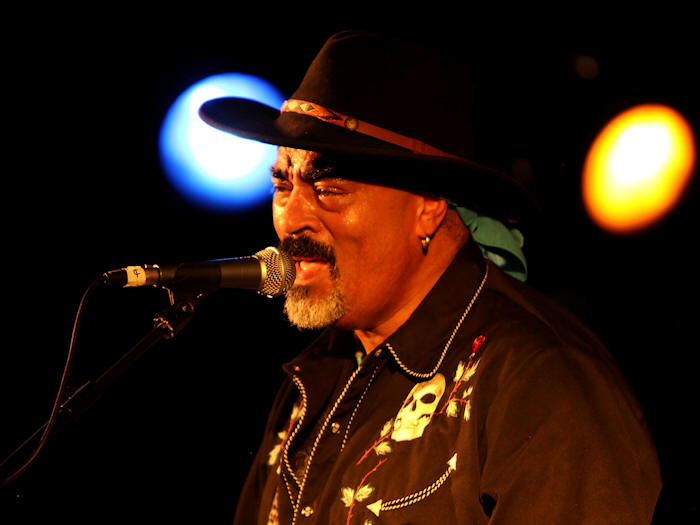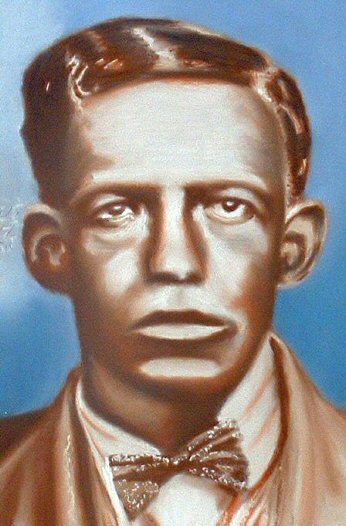
Painting © 2004 Loz
Arkle
Website
© Copyright 2000-2011 Alan White - All
Rights Reserved
Site optimised for Microsoft Internet Explorer
Early Blues Interview
|
|
"Gregg
Wright brings down the house in no time!"
"Gregg Wright is no stranger in these parts - he's welcomed onto the
stage by a full house, and I mean full house! The place is awash with
people! He's given a hero's welcome, and sets about bringing the house
down in no time at all. This man is not given to gentle introductions or
formalities - he's straight down to business and his business is Rockin'
Blues! If you like your Blues dosed up in easy to swallow chunks, don't
bother coming. Gregg's medicine is served up in massive infusions
straight into the jugular. Overdoses are regular and the poor victims
are seen staggering down the stairs at intervals, and at the end of the
evening's session. There's no antidote available at these gigs so I'm
afraid to say that victims have to "cold turkey" it out, post
performance! His rhythm section maintain the high octane performance
demanded by the Schumacher of Blues. Musicians in the audience had eyes
like kids in Toys 'R' Us just before Christmas. Several surreptitiously
played air guitars during some of the numbers and were singing along to
many a song and psalm from the Gregg Wright Book of Hymnals. His set
contains a nice mix of golden Blues oldies, stirred in with several
numbers off his CDs. I tell you, the crowd not only like this guy, they
love him!"
Gregg: I was actually born on the East Coast in Jersey but I spent part of my youth in Wichita Falls, which is where I picked up the guitar. My earliest musical memory is of my mother playing the piano in church. There was always music in our house but my parents were very open minded and they liked to listen to everything. I remember my mother used to like to listen to a lot of the ballroom dancing stuff, my Dad was a jazz guy, and I liked rock and roll. I didnít really want to know anything about blues because to me that was old peopleís music. Alan: Did you always want to become a musician? Gregg: I donít know if I always wanted to become a musician but Iíve always been a musician, but I just didnít know that was what it was called. When I was a kid I used to think there was something wrong with me because I always used to make up these little melodies for whatever was happening in my life, you know like, if I had to pee against a tree out in the woods then I used to sing about it. Alan: How did you get started in music? I think your father was in the military so you must have moved around a lot? Gregg: We did, so it was good preparation for the life I picked as an adult and Iím now used to moving around. Alan: How did your professional career start? Gregg: My Dad was stationed at a place called Sheppard Air Force base in Texas. Thereís not a whole lot to do around Wichita Falls other than chase jack rabbits or play football or be in a band. On the base they used to have a teen centre and every weekend they had these dances, with bands. From the minute I walked in and saw my first live band I was just hooked. Iíd stand right in front of the guitar player and just watch everything his hands were doing, thinking how on earth did he do that. I eventually pestered my parents to get me a guitar?
Gregg: The first guitar riff I ever played was Sunshine of My Love by Cream. I loved that big distorted sound and that great vibrato sound that Clapton had, even though I didnít know how that was done. Alan: So what first attracted you to the blues? Gregg: A lot of the rock that came out in the late 60s, especially from Britain, was by all these guys who had been influenced by the blues but it didnít sound like the blues to me because Iíd heard the blues the way my parents and grandparents listened to it, but I recognised some of the licks, so this was like super-powered blues. Iíd argue with my parents and Iíd say, ďNo, this is rock and rollĒ but theyíd be saying ďNo, those guys are playing the blues manĒ. All that Hendrix, Clapton, Jimmy Paige, Jeff Beck, all those guys were seriously rooted in the blues but they happened to plug into Marshalls which made it sound different. So I kind of went full circle and started from there. I guess as you develop as a musician you start looking for deeper meaning and deeper feeling and you arrive back where you started. Alan: Earlier in your career you opened for blues legends like Albert King, Freddy King and many others. Tell me about those experiences. Gregg: That was in the mid 70s and through my travels I had ended up getting a call from a friend to go and play some gigs down in Louisiana. I never had any designs on ever going to Louisiana but, wow, what a treasure trove of culture and music and I got really absorbed in it. We had a good local band and weíd had a local record out that had done reasonably well for us so we were starting to get calls to do opening shows for some of the major people that were passing with. So I opened for Albert King several times and I actually did a small tour opening for Freddy King. That was like dynamite going off in my head, being with those guys, talking with them and really seeing up close what it is that they do.
Gregg: Playing with Michael, who then was at the peak of his thing with Thriller out, was the kind of mania that Iíd always dreamed of being part of. When I was a kid, the sight of the Beatles running down the street being chased by 50,000 girls tends to have a big impression on a fella! It looked like a good job to me. The reality was much different to the fantasy or the dream. If youíve ever seen The Ten Commandments with Charlton Heston when he comes down from Mount Sinai after talking to the burning bush, his eyes are like this big and his hair and beard are turn shockingly white...well after a year and a half playing with Michael, being on tour with those guys and operating at that level, thatís how I felt. Alan: A lotís been written and said about Michael Jackson but he seemed to be a good man. Gregg: He was a good man. I felt really bad about all those allegations with all that stuff and I knew it wasnít true. On that tour, city after city, hotel after hotel, you could see the hyena sitting out there waiting for an opportunity to do something and I knew thatís what that was. The thing that people donít realise, and I hope one day to write a book about it, is that he didnít just one day wake up as Michael Jackson. That guy worked harder than anybody. We would do these two and half hour shows which were just a real marathon of physical fitness and energy output and it was not uncommon after the shows for the rest of us to be collapsed in our rooms. He used to carry this little 10 x 10 foldaway wooden floor and if you happened to be in the hotel room beneath his it was not uncommon to hear him at 2 oíclock in the morning practicing.
Gregg: When I first started I was really on the Hendrix thing and that really stuck with me in different ways but really and truly Iím at a stage now in my music development where I think Iíve really found my own voice and I seem to be just snatching things out of the air. Alan: Are there any particular songs you play that have a special meaning to you? Gregg: I think they all do, itís kind of like your kids. You love Ďem all. Alan: Tell me about the band, whoís with you now? Gregg: We have Marty Prior playing bass guitar, who is a very fine bass player. We have Spencer Lee Gordon who is some kind of insane genius because he plays about five instruments just extremely well, and I canít tell which one he really plays. Alan: Tell me about the making of your latest album, King of the Rocking Blues. Gregg: The tracks are all my own compositions, and I have a full production studio at my house so we did it there. I seem on this record to be reflecting back on the stuff I heard as a little kid. This is probably the most rootsy record Iíve ever done. Alan: You have a reputation for putting your all into every performance; your shows are legendary - gaining the accolade as the 'King of the Rockin' Blues! What is it that drives you? Gregg: I have no idea! To me, it just seems like Iím standing still and looking out at the audience but apparently thatís not what happens, so I donít know, maybe I just get swept up in the music. Alan: In my research, I found a quote, "Diplomacy through music.. a cost effective, educational and fun way to keep the peace". Do you see music having a greater diplomatic role in the future? Gregg: It could be. I donít think the powers that be will ever allow or condone something like that, but really itís like trying to keep gas in a bottle and you canít. No matter what they do or think, or how they try to inhibit it, music is like an electrical current and you canít stop it. I went to play in Serbia this year, a former Soviet bloc country and at one time my country was planning how to blow these people off the face of the earth and I guess they were planning the same thing for us. And now after trillions and gazillions of dollars wasted on these elaborate weapons systems which only had one conclusion, 50 years of that and nothing, absolutely nothing was accomplished, then comes along little old me with my little Strad and a plug-in amp and everybody is on the same page. We didnít even speak the same language and Iím sure lots of other musicians have found the same thing. Music transcends, it heals and thereís much more to it than just entertainment. The main street media tends to trivialise what music really is and create cartoon caricatures of music people, but thatís not what music is.
Alan: Youíve published 10 'Must Know' tips for career musicians on your website, which I think is priceless, absolutely wonderful, but I wondered how you feel about musicians having a rapport with the audience on stage and whether that is important. Gregg: I think it is, it really is. I always used to find it really difficult to talk to an audience, I didnít know what to say so Iíd hold my head down and play and think that was enough. But I guess as you get older and you get more comfortable in your skin you want to communicate with people. Alan: People do appreciate it more, they feel more special. Gregg: Yes, as a performer you are shooting for a certain unity, a oneness, a togetherness. If you donít communicate with the audience on a verbal level then you tend to feel like thereís a gap and are a little less effective. Alan: So what are your future plans? Gregg: Working on a new album right now but no idea what itís going to be called. Iím just going with it. See, this is another thing as Iíve gotten older, and Iíve stopped trying to write things. I just sort of let them happen and itís a lot more positive result. Weíve got about half the album nearly canned and it seems to be that this one is a lot more aggressive, more hard hitting and I seem to be playing much more sinister guitar. Weíll get it out early next year. Alan: Thank you very much for that Gregg, and good luck with the new album. _________________________________________________________________________
"This
album places Gregg Wright in the top echelons of the great blues
guitarists!" "Wow! What an album! Expecting high standards
from Gregg, and this album delivers! It's as if he's playing live to you
in your own front room Ė turn the speakers up and be absorbed in the
Blues, with the winning combination of great and very relevant lyrics
for the 21st century combined with good old fashioned solid
musicianship. Tracks such as ďCry Myself A RiverĒ; ďBayou MoonĒ and
ďTricked By the DevilĒ demonstrate the depth of this guys talent. It is
not an exaggeration that this album places Gregg Wright in the top
echelons of the great blues guitarists. This album creates the
spellbinding sound that Gregg produces during his live performances. It
is a rare commodity, the demonstration of stellar guitar skills and a
soulful voice, that shapes the lyrics to ensure the emotions are
delivered on time every time. The title track ďKing of the Rockiní
BluesĒ; neatly sums up this album and Gregg has every right to see
himself as a King when it comes to rockiní and soulful blues".
Check out Gregg at the Carlisle Blues Festival _________________________________________________________________________
Return to
Blues Interviews List |








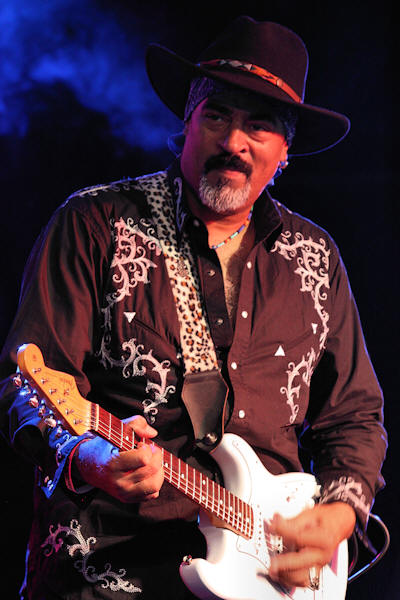
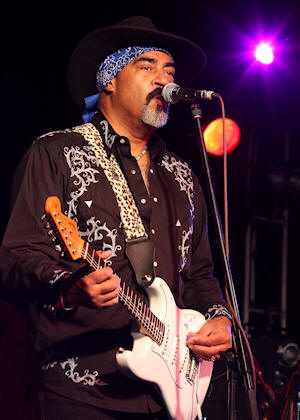 Alan:
What were your first musical memories growing up in Wichita Falls,
Texas?
Alan:
What were your first musical memories growing up in Wichita Falls,
Texas?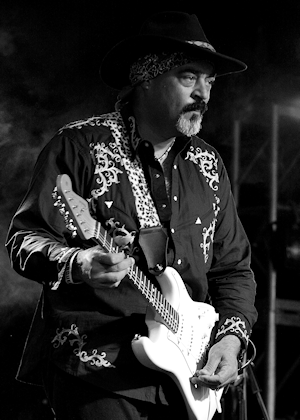 Alan:
So what music did you play in the early days?
Alan:
So what music did you play in the early days?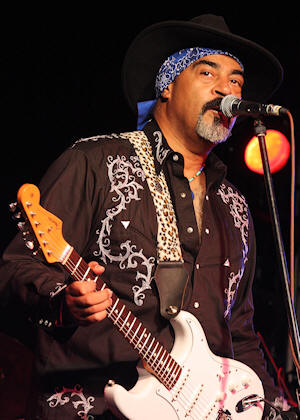 Alan:
After moving to Los Angeles in the Ď80s, you were hailed as ďthe man
in music history to have played with the two biggest record sellers of
all time, Michael Jackson and Mick Fleetwood. There must have been some
amazing experiences.
Alan:
After moving to Los Angeles in the Ď80s, you were hailed as ďthe man
in music history to have played with the two biggest record sellers of
all time, Michael Jackson and Mick Fleetwood. There must have been some
amazing experiences.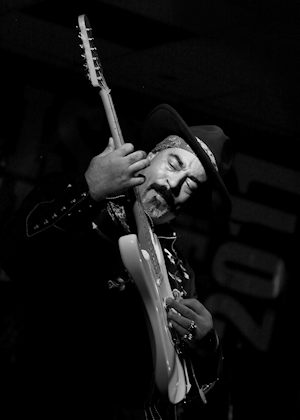 Alan:
Who influence you most in your music writing and playing?
Alan:
Who influence you most in your music writing and playing?